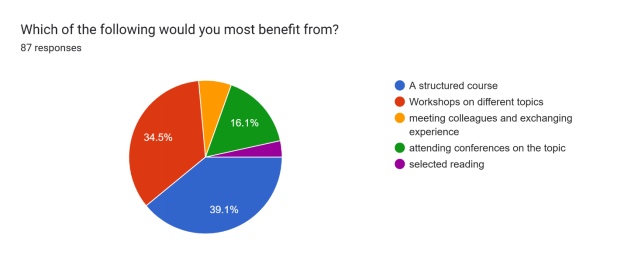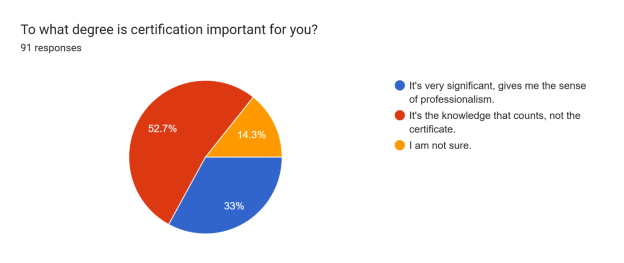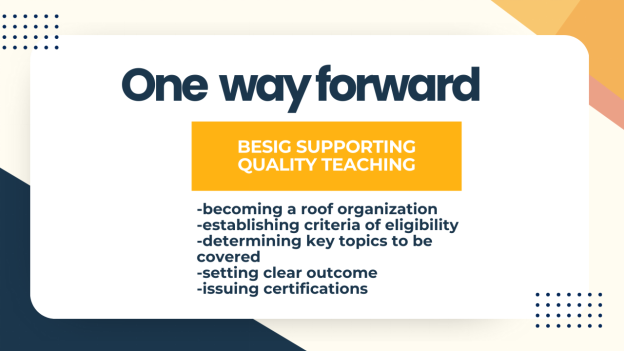Teaching Business English: Paths and Possibilities
Jelena Perišić is a Business English teacher and a small teaching business owner from Serbia. She delivers online custom-made Business English courses to companies and individuals focusing on business and soft skills. As a teacher trainer, she conducts How to teach Business English course to teachers wanting to engage in teaching Business English and is the author of two e-books: Small Talk: Big Deal and Get that job. Email: jelena@poslovniengleski.rs
Editorial
This is a recap of the presentation delivered at 38 IATEFL BESIG conference in Malta, in November 2024, which focused on exploring what is required to start teaching Business English in today’s complex professional environment and proposed strategies to ensure high-quality teaching from the very start in this career.
Who are Business English teachers today?
Being a Business English teacher and a teacher trainer, I have always followed the trends in this industry. I am curious to learn who is qualified to teach Business English, which academic background these teachers hold, as well as what their business and teaching experience is. In order to get some solid evidence, I have conducted a small-scale survey in Serbia in October last year which involved around 100 Business English teachers. The survey revealed the following results:
-60% of teachers engaged in teaching Business English had over 10 years of teaching experience and approximately the same number worked in private language schools.
-51 % of them holds Master’s Degree or above, but out of 49 teachers with no English language teaching qualifications, 30.9% haven’t certified their English knowledge in any way.
-92,7% of all the surveyed teachers think that demand for teaching Business English will increase in the future.
Asked about the most prevalent challenges in teaching Business English, the following 5 were the most commonly ticked: lack of knowledge of business (50.7%), difficulty in finding and creating teaching and learning material (41.8%), unfamiliarity with the language of business (38.8%), lack of formal training (32.8%) and the fifth place is shared between teaching meeting skills and conducting needs analyses to base their learning plan on (28.4%)
Out of 43 people who answered the question: ‘Which Business English teaching training are you aware of?’, a few people mentioned Udemy, Oxford, TOEFL, Cambridge and British Council, only one person named International House, and a couple of teachers familiar with my work mentioned the training that I deliver.


The bottom-line conclusion (having in mind that this was a rather informal, and not in any way scientific research due to the lack of knowledge on my side) could be that teachers see the potential in teaching Business English, but are not fully aware of the necessary skills nor are familiar with courses that can help them gain those skills and set them on the right path of teaching with confidence and genuine understanding of the requirements. The participants who attended the presentation agreed that the situation was very similar in the countries they come from.
The second part of the presentation was dealing with the actual skills and competencies needed to start teaching Business English successfully. Three main types of skills were identified.

The first type refers to hard skills, involving thorough knowledge of the language, language teaching practices, variety of teaching approaches, understanding of language skills, level determination, needs analysis conduction, creating a program accordingly, testing, learning styles, giving feedback and everything that teaching English is all about. Ultimately, we also require lesson planning, identification of lesson outcomes and error correction. To gain this kind of knowledge, some formal education is vital, be it a BA/MA in English language or language teaching, or, to a lesser degree, in my opinion, courses such as TEFL, TESOL or CELTA. What seems to be overlooked in these courses is the knowledge about the language, which is a prerogative that cannot be overlooked. However, theoretical knowledge in itself, is not enough; therefore, teaching practice and some teaching experience is necessary before engaging in teaching Business English.
Secondly, a Business English teacher will be both teaching business skills and engage in business relationships with company owners, managers and other company representatives, plus should be walking the walk, not just talking the talk to serve as a role model to their students. These ‘soft’ skills comprise professional communication, both spoken and written, the ability to establish rapport, intercultural awareness, as well as negotiations, networking, time management, reporting and other extremely significant skills that can affect task completion in the workplace. Additionally, we commonly act as a liaison between the HR, management and employees and need to deal with various interpersonal relationships, so people skills, flexibility and the ability to jump into different roles are a must. The degree to which we possess, develop and exhibit these skills will, in return, build trust of potential students and collaborators regarding our competencies as Business English teachers.
Furthermore, in the increasingly digitalized world, with students that are getting younger and used to being stimulated, engaged and taught in a much faster and brain-friendly manner, we are expected to be able to offer a smooth and modern experience relying on digital tools.
Effective use of online platforms, LMS, AI, different apps available today, and other useful tools helps us save time, be more relevant and up-to-date, as well as provide engaging lessons which maintain the motivation of our students.
Taking this range of different skills into consideration, the question is which options enable prospective Business English teachers to gain them. Surprisingly, there are not too many of them in the market, despite the growing demand for this type of service. They include gaining knowledge through practical teaching, finding a mentor, buying a self-study course on various online platforms, or attending those offered by more renowned organizations in the ELT. No MA, BA or specialist studies in teaching Business English have been found, which is a contradiction in itself.

Logically, the existing options are very different when we compare them in regards to the following criteria: entry requirements, expected outcome, the trainer, adaptablility to different experiences, interests and background of the attendees, soft skills teaching, price, length, practical work involved and certification.
Learning through teaching is time-consuming and prone to making misjudgements. Finding an experienced mentor ticks all the right boxes, but a good mentor is hard to find, plus you receive no certification. Buying an online course can be tricky, since you cannot know who teaches it, what their credential are, nor whether these courses are in any way adaptive to the teachers’ own context and knowledge. Although usually affordable, they cannot in any way possible check to what degree has a participant met the required standards. On the other hand, although offering a certificate, courses offered by a more renowned educational organizations are much more expensive, and offer no practical work, to which a proper feedback could be given. Because of all this, some experienced Business English teachers, myself included, have developed and are conducting training aimed at teachers who want to start this career.
The problem is that no one monitors what we do or how we do it, since there are no prescribed standards. Stemming from this is the conclusion that training of Business English teachers is still a kind of a ’grey area’, and that establishing transparent and mandatory criteria is needed if we intend to secure effective, efficient and professional service in the years to come.
One potential and logical solution could be that IATEFL/BESIG, which gathers eminent professionals from the world of TEFL and BELF composes a relevant working group which would prescibe criteria as to what an appropriate Business English training should comprise, who can conduct it, who to, with what outcome, and provide regular check-ups on organizations and individuals delivering these. In this way, BESIG could not only ensure quality teaching (as quality control body), but also become the most relevant organization which could issue valid certifications for Business English teaching. It could propose a list of organizations and individuals who meet those criteria and who potential teaching candidates could choose from knowing that they will get all it takes to start teaching Business English confidently.

In summary, the topic of education of Business English teachers can be compared to an elephant in the room: acknowledged yet insufficiently addressed. While uncertainties remain regarding the feasibility and leadership of such an initiative, its pressing necessity will have to lead to this gap being bridged either by BESIG or a similar entity recognizing and addressing this potential.
Coming soon! Please check the Pilgrims in Segovia Teacher Training courses 2026 at Pilgrims website
Teaching Business English: Paths and Possibilities
Jelena Perišić, Serbia50 Ways to Teach Business English, Tips for ESL/EFL Teachers
Marjorie Rosenberg, AustriaFluency Activities for Small Talk in Business English
John Hughes, UKWriting Materials for Business English
John Hughes, UK10 ideas from ETpedia Business English from Pavilion
One-to-One: An Updated and Practical Guide to Teaching. A New Addition to Your CPD Collection
review by Oksana Hera, UkraineBusiness Impact. Business English Modules from DELTA Publishing, with a Short Review, by Hanna Kryszewska, Poland
Hanna Kryszewska, PolandA Golden Classic: Tree Swing Cartoons
Hanna Kryszewska, Poland